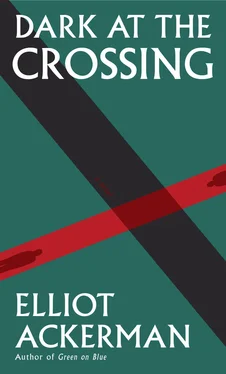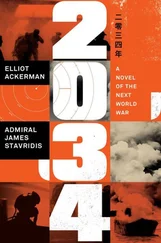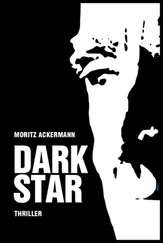They step inside.
Kifa, sensing the danger these two pose, climbs into her mother’s arms. Daphne, sensing the same, pushes herself into a corner of the bed, pulling the blanket up around her and Kifa.
“Who are these men?” she asks.
Before he can answer, Jim says: “They aren’t yours, Haris.”
“Who’s Haris?” asks Daphne.
And Haris, understanding that Daphne thinks he’s Amir, knows the men at his door see him differently than do the woman and girl in his bed.
“They can’t stay with you,” says Saied, as both he and Jim step into the small room.
Haris places his body in front of Kifa and Daphne, his arms spread wide.
Jim and Saied continue toward them, refusing to stop. They move to the bed, slowly, but with relentless force. Like water on stone, or a tree root through the sidewalk, or time. There’s nothing Haris can do.
“Amir!” shouts Daphne.
Kifa cries into her mother’s shoulder.
Haris glances at his reflection — he remains Amir. He glances at Jim and Saied — he remains Haris. Blood rushes to his head, and a great clarity envelops him. He lunges at Jim, grasping his pistol from where it dangles in a holster on his leg. Drawing the pistol, Haris raises it high in the air, wielding it like a torch to darkness. Before he can do anything, Jim and Saied both begin to laugh at him. Louder and louder they laugh. Haris turns toward Kifa and Daphne. They’re both trying to tell him something, but he can’t make out their words above the roaring laughter.
Then, regaining himself, Jim says to Haris: “You can’t make a home for this family, bud.”
“You took away my home,” Haris answers.
He levels the pistol at Jim and Saied.
Jim returns to his laughing. Before Haris can do anything, he’s again overtaken by his urge to protect, but within him that urge mutates with a perverse twisting in his guts. He glances at himself in the mirror one last time and, knowing what he must do, he no longer views Amir’s reflection, but sees his own staring back, bringing unity to what everyone in the room now understands. There is silence, and— bang! bang! — Haris shoots Kifa, shoots Daphne and, fixing his blue pajamas and smoothing down the hair on his balding crown, presses the gun to his head.
And with the gun to his head he awoke.
Daphne had returned to the apartment and flicked on the light in her room.
—
Lying onthe sofa bed, Haris groped through the darkness. He found his pants folded in a pile on the floor. In his pocket was the Nokia. He plugged it into his charger and waited as it slowly powered on.
The screen was locked, but the code immediately occurred to him — Saladin1984. He tapped in the four digits. The interface shone brightly, causing him to squint. Set as a background screen was a photo of Aleppo’s skyline before the war — the square minaret of the Umayyad Mosque, the Citadel’s ramparts, hundreds of balconied apartments. In the lower-left corner was the small envelope icon: Saied’s email. Haris’s first instinct was to sift through the account. Just as he went to do so, anxiety overcame him. Saied had cheated him before. Haris feared other deceptions awaited him in the emails. Instead of looking at them right away, he wandered around the rest of the phone’s interface.
He opened the notes feature first — a scroll of bulleted annotations. They looked like grocery lists. Then, mixing with the groceries, came other items: apricots—4 kilos, milk—10 gallons, 7.62 x 39–10,000 rounds, oranges—6 kilos, RPG-7—10 rockets, salt — half kilo, rice—30 kilos. Each page was a week’s worth of supplies, and the weeks ran in pages and pages.
Haris opened the photos next. The most recent were of crated vegetables mixed with ammunition and military hardware — carrots, belted machine-gun rounds, cans of condensed milk, radio batteries. Haris scrolled through them, traveling backward in time. At first the images mirrored the lists, food mixing with weapons and supplies, as if nothing else in Saied’s life merited a photograph. Then a woman appeared in one of the photos. She crouched over some bedding in a cavernous cement building, which was likely Saied’s warehouse. Halogen lights cast shadows across the empty space. The woman raised her hazel eyes up toward the camera. From beneath a cheap linen hijab, her lips pushed forward as if to ask a question. Haris continued to scroll backward, flicking through the images of Azaz faster and faster. As if through a zoetrope, the city seemed to rebuild itself. The woman lost her hijab. Mascara appeared around her questioning eyes, and these eyes lost their question. The rubbled streets cleaned themselves and filled with people. Then, slowly, Saied appeared in the photos, standing with his wife instead of behind the camera.
Haris stopped looking.
Satisfied that Saied had told him the truth about his life before and during the war, Haris decided to sort through the emails, beginning when he’d been in Michigan. Interspersed with this correspondence was that of other would-be fighters, some who’d crossed the border, others whom Saied had unsuccessfully urged to come. Then, this past week, just as Haris had found himself at the border, Saied had stopped replying to emails. A long string of unopened messages crammed his temporarily disabled inbox until two days ago, when a single query resumed the activity on Saladin1984’s account. What followed was a negotiation between Saied and Athid.
The exchange lacked any ideological pretext, no reference to the mosaic of groups entrenched in the war. Saied simply offered Athid three thousand dollars to take a pious — albeit unnamed — fighter across the border with a woman from Aleppo. Athid agreed, but countered with a price of five thousand dollars. A frantic round of emails ensued, the last one containing Athid’s final offer: four thousand dollars.
Saied never replied.
Coming to the end of the thread, Haris wanted to believe Saied had negotiated in order to get him the best deal. But he knew Saied would’ve kept the whole five thousand, regardless of what he arranged with Athid. Strangely, the idea of crossing the border with an Islamist hard-liner like Athid didn’t make Haris nervous. He took solace in the emails’ pragmatic haggling. Free Army democrats, regime loyalists, Daesh Islamists — an ideology needed funding, and this necessity made funding the greatest ideology.
Palming the Nokia, Haris lay on his back, uncertain what to do. He wasn’t sure how Athid would react to seeing him again. Since coming to the border, he hadn’t lost his desire to fight. What he had lost was clarity — the Free Army’s revolution, the Daesh’s jihad, their causes had muddled, leading nowhere. His eyes wandered the apartment, eventually resting on the mirrored wall. He’d come to define his cause in more narrow terms. He gazed at the cracked-open door to Daphne’s room. Nothing had been solved for her. She still slept alone in the light. Amir would return from Marty’s in the morning, and the familiar pattern of her life, Amir’s, and now his own would resume in Antep.
With this on his mind, Haris composed a reply:
Athid,
My apologies for not answering sooner. I needed to confirm details. The pair I told you of are ready to depart. Please send instructions on when and where you would like to meet them.
Peace be upon you,
Saladin
Haris hit send and placed the Nokia on his chest, lacing his fingers over it. He shut his eyes, but couldn’t sleep. He had taken the first step and wondered if there would be a second. He felt a measure of guilt that he hadn’t waited to consult Daphne and Amir. They would have strong reservations about casting their lot with Athid — Amir in particular, for it was Athid and those like him who had hijacked his revolution, miring its democratic ideals in Islamism. Holding the Nokia, Haris stared at his hands, imagining them without fingertips.
Читать дальше












